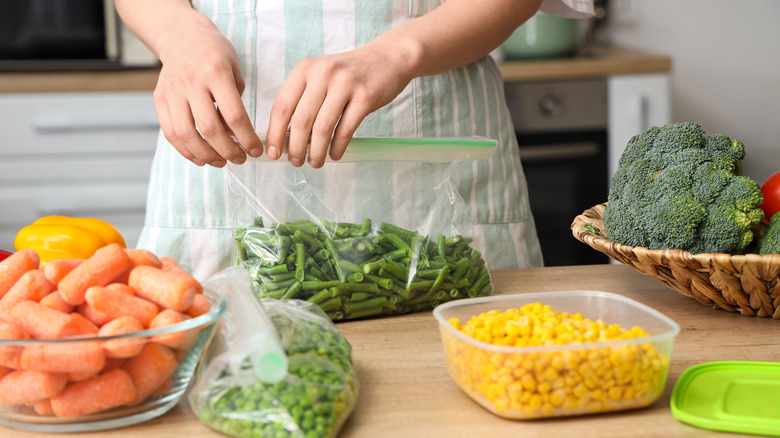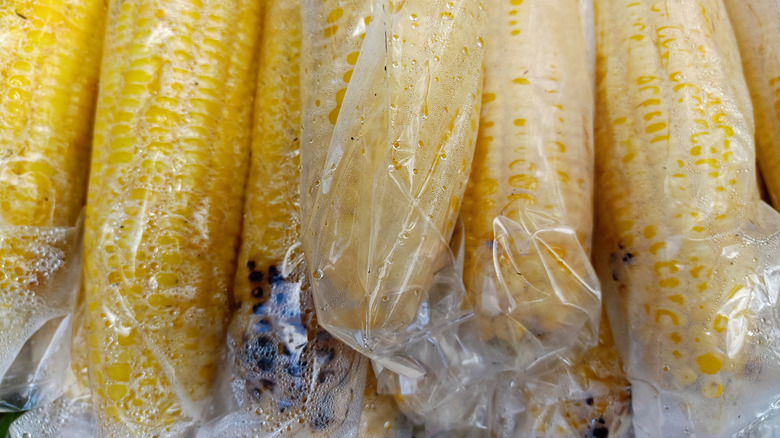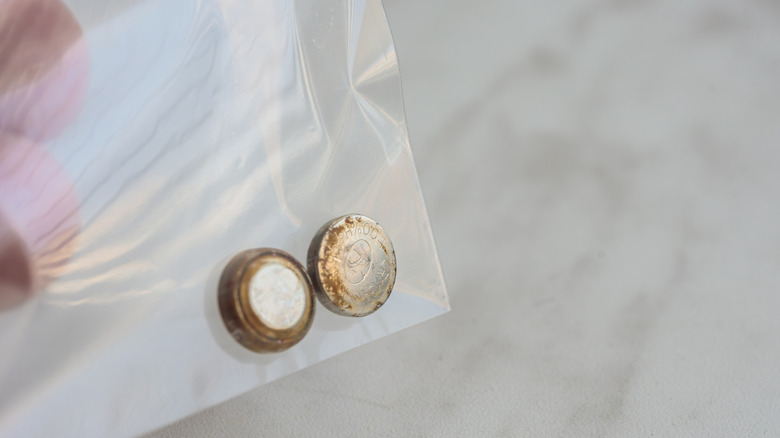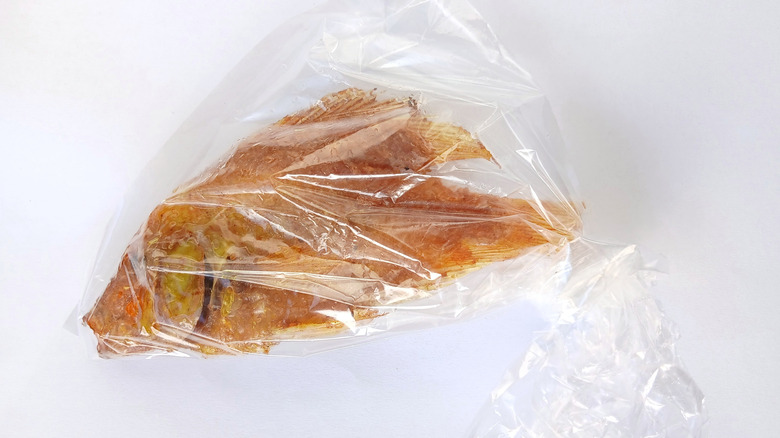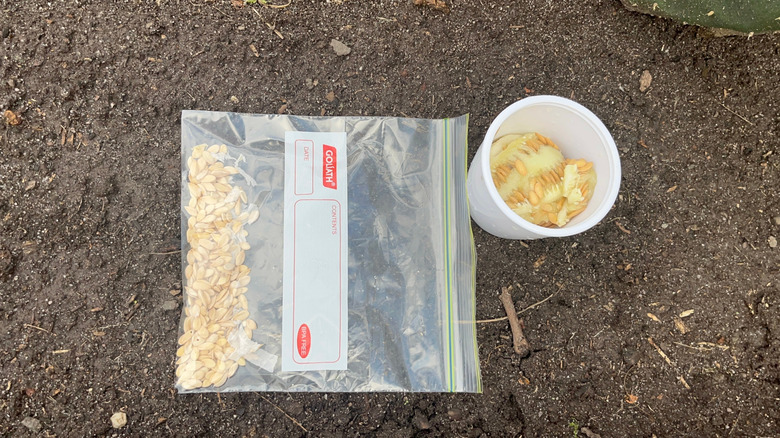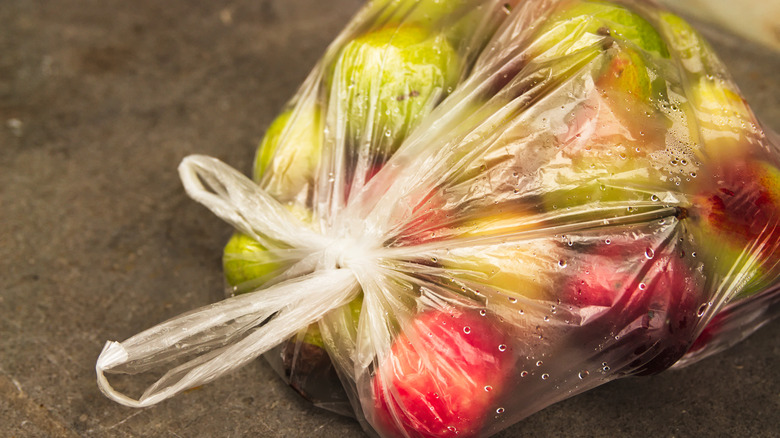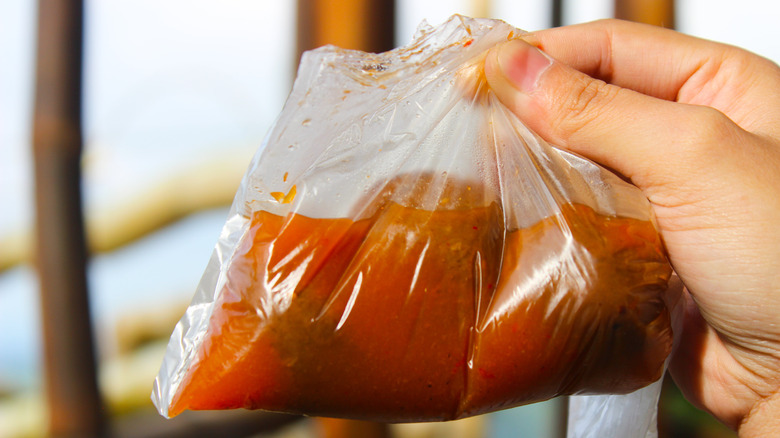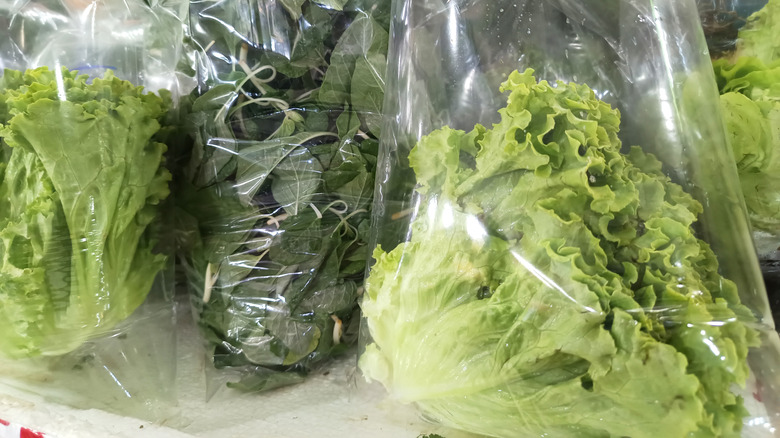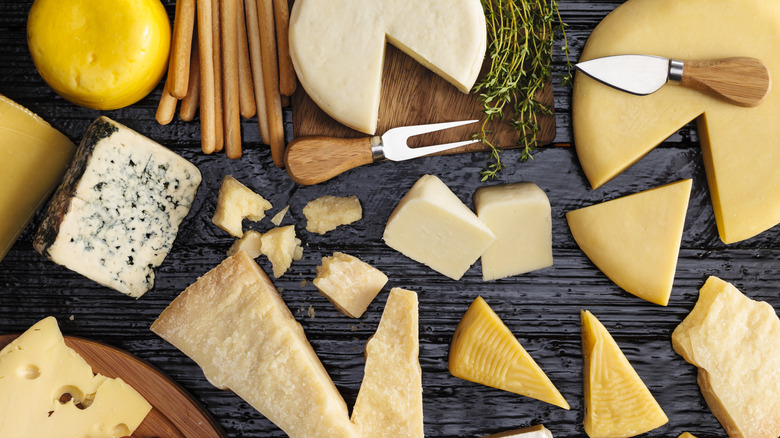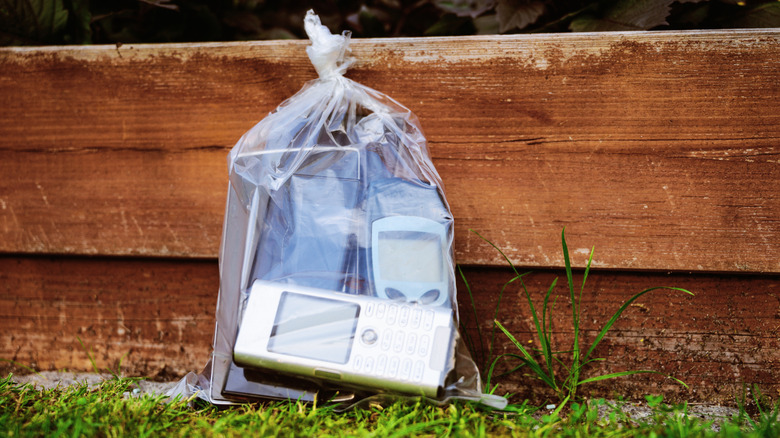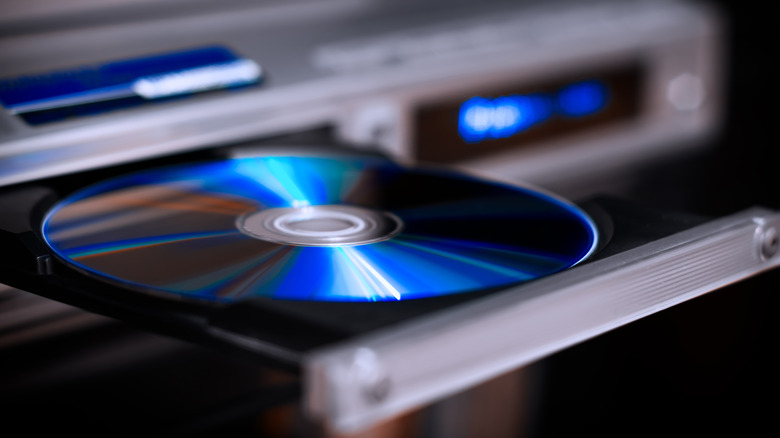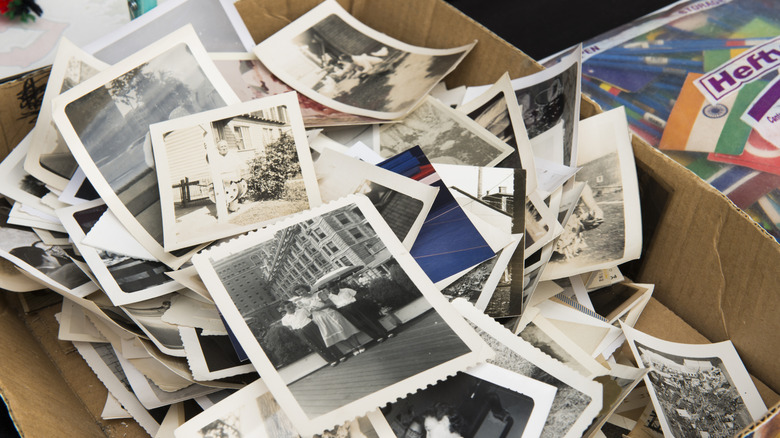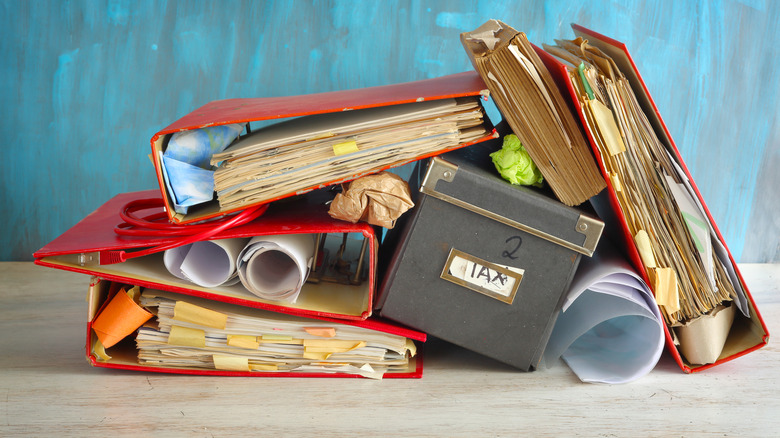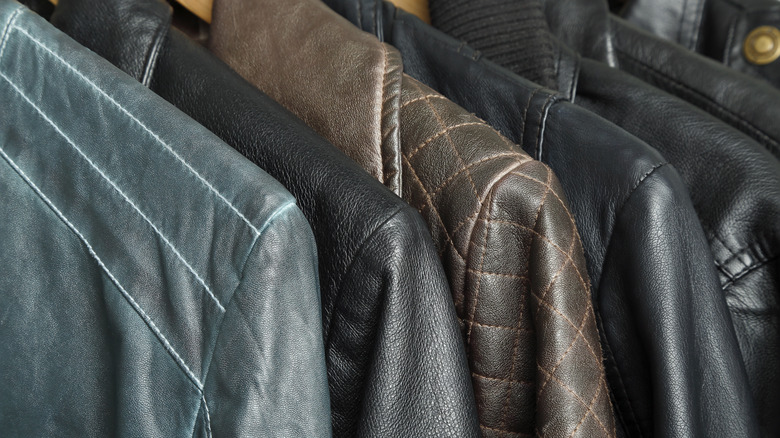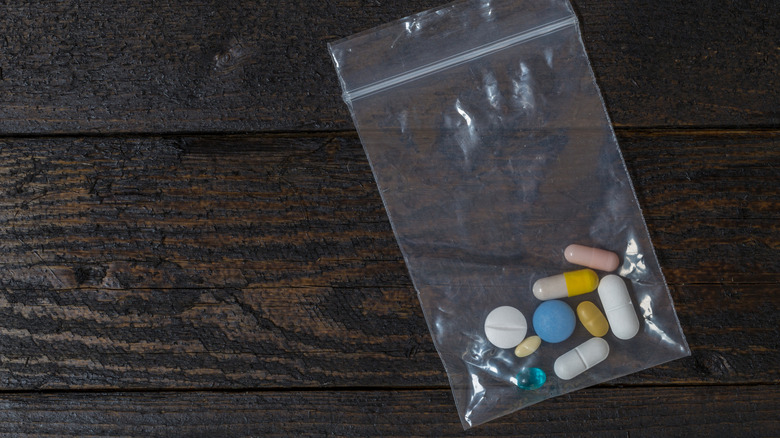Avoid Storing These 15 Common Items In Clear Plastic Bags At All Costs
You've probably used clear plastic bags to store everything from leftovers, toiletries for travel, or even spare blankets. Transparent plastic storage bags make it easy to protect items from the elements while making it possible to see what's inside. Not to mention, there are a lot of clever ways to repurpose resealable plastic bags for your home or garden, which create unlimited potential for their use. But did you know that there are some things you shouldn't store in clear plastic bags? While some items store well in these bags, some items don't, and it may even be dangerous for others. High-fat foods, high-acid foods, hot foods, or even household items like batteries shouldn't be stored in clear plastic bags.
There are many people who think that it's time to ditch the plastic bags. There are even some that believe we should stop using plastic bags entirely — and for many good reasons. But for those who still find them extremely useful and aren't willing to give them up, it's important to know how to use them safely. The very nature of these bags, being made of plastic, is one reason why you shouldn't store certain items in them. The plastic these bags are made of can leach when exposed to extreme heat, they can allow moisture in, and they aren't always perfectly airtight (user error happens). These facts are just a few of the reasons why it's important to know what to avoid storing in clear plastic bags.
Hot foods
While there are some plastic bags designed for heat, many are not. You should never pour hot foods into a clear plastic storage bag. The heat from the food can break down the plastic and cause chemicals to leach into your food. It is also a serious burn risk, as the heat can compromise the bag's integrity, which can cause dangerous spills or even melt the bag. It's a better idea to wait until the food is completely cool before putting it into bags for storage. This is the same reason why you should not microwave food in clear plastic bags.
Batteries
Keeping loose batteries in a clear plastic storage bag is never a good idea. Even if batteries appear to be dead, they can still discharge if their ends touch each other, causing a spark or fire. Batteries can also leak acid, which will corrode the plastic bag and anything it touches. Storing new batteries this way can also cause them to drain faster. It's best to store batteries in their original packaging, if possible. Putting them away from children is also a good idea, as plastic bags are easy for little ones to get into.
Oily/fatty foods
Oily or fatty foods should not be stored in plastic containers, especially plastic bags. The fats or oils in specific foods have a higher ability to absorb the chemicals that these bags are made of. This means you're more likely to unknowingly ingest harmful chemicals like phthalates and DEHA. It's a better idea to store these types of foods in glass or ceramic containers.
Seeds for planting
When storing seeds for planting, you want them not to sprout or mold during storage. That's why using a clear plastic bag is not a good idea. The best method for storing seeds is in a dark, cool, and dry location. Plastic bags allow light in, create the perfect environment for the seed to grow mold, and they aren't good insulators. That's why it's a better idea to store seeds in an airtight location that doesn't allow light exposure and stays at a consistent temperature. Some great options are a vacuum-sealed jar or a sealable metal tin.
Fruits that produce ethylene gas as they ripen
Ethylene is a plant hormone that is emitted from fruit in gas form as it ripens. Popular tree fruits, like apples, pears, bananas, and apricots, release this gas in large amounts. And many other fruits release ethylene, like avocados, tomatoes, and cantaloupes. When you store these fruits in plastic bags, the gas gets trapped and will cause your produce to ripen too quickly. It's best to keep these fruits in baskets, paper bags, or even slice and freeze them.
Acidic foods
As with hot foods and oily/fatty foods, acidic foods also have the ability to break down the plastic clear storage bags are made of. Highly acidic foods, by their very nature, can cause leaching of chemicals into your food from the plastic bag. So, it's probably a better idea to store lemons, tomato-based recipes, and anything that causes you heartburn, in a glass or ceramic container. You likely don't want your bolognese filled with PFAs.
Fresh herbs or leafy greens
You're probably thinking that this is counterintuitive, as most leafy greens and herbs come in bags from the store. The bags greens are sold in, are meant for transportation. Greens and herbs need air circulation to stay fresh, and plastic bags aren't good for that. Moisture can build up in a storage bag full of herbs or lettuce, and then your produce rots before you can use it. Store lettuce in a salad spinner or colander. Herbs can be stored in a glass with some water, either in the refrigerator or on the counter.
Cheese
Who among us hasn't removed cheese from its original packaging just to put it in a storage bag in the fridge? Well, unfortunately, that may be why your cheese isn't staying fresh as long. While it's okay to store some cheese — those with short shelf lives — in plastic bags, others need a little more love. Hard, flavorful, and aged cheeses do better when they are not suffocated. Wrap these cheeses in parchment instead. Feta and mozzarella do best when kept in a brine made of water and a little salt.
Electronics
Clear plastic bags are not a good way to store electronics, as they are the perfect environment for moisture and static. Whenever you are storing electronics, those are the two things you absolutely want to avoid. When an electronic device becomes statically charged, it can pass that charge on to other electronics. Static can damage or destroy electronic devices. This is one of the reasons electronics are assembled in "clean rooms". And, of course, water is never a good idea around anything electric. There are special static-free bags made specifically for storing electronic components and devices.
Books/comic books
Because clear plastic bags have the tendency to trap moisture, it's not a good idea to use them to store books. One of the biggest enemies of books is mold. You're better off storing your books in a cardboard box in a climate- and moisture-controlled environment. There are special sleeves you can use to store comic books within a banker box or a special comic book storage box.
CDs or DVDs
Because CDs and DVDs themselves are made of plastic, it's important not to store them in clear plastic bags, as UV light will destroy them over time. As mentioned for other items on this list, moisture retention is also another thing that will damage them. If possible, you're better off storing them in jewel cases, which will protect them from light and moisture. If you have the original case for your CD or DVD, even better.
Photographs/negatives
Photographs and negatives should never be stored in traditional clear plastic bags. The process by which photos and negatives are made requires specific chemicals, which, as they age, will off-gas. Plastic bags will cause these gases to accumulate and damage the photos. You should always store photos individually in acid-free paper sleeves, in storage boxes for the best preservation of your memories. You can always choose to store your photos and negatives in an archival-quality photo album as well.
Important documents
For important documents, if you're storing them long-term, you should use paper envelopes. Clear plastic bags, once again, will not protect documents from moisture or UV light (which can fade ink). If you're concerned about fire or flood, there are fireproof document bags you can use, as well as air-tight safes to protect from flood damage. If you are storing your documents for the short term — say, just for a trip — plastic bags are okay to use.
Delicate or natural fabrics
Clear plastic bags are not good for storing silk, leather, or other natural fabric items. They don't allow the fabric to breathe, allow light through (causing discoloration), do not prevent pest infestations, and can retain moisture from the fabric. You are better off using a cotton garment bag, which will protect your clothes from these issues.
Medications or supplements
There are a couple of reasons why you would not want to store medications or supplements in clear plastic bags. The biggest is plastic leaching into the medicine, which can cause health issues as well as reduce the effectiveness of your medication. Another big reason is that if you are storing your pills loosely in the bags, you may get your medication mixed up, which can have deadly results. It's best to keep medication or supplements in their original packaging or a pill container.
